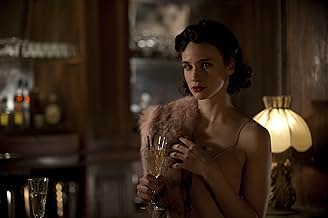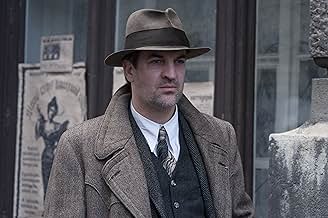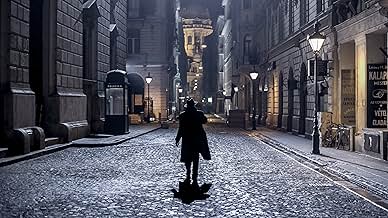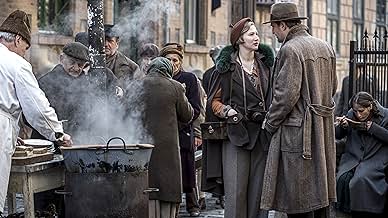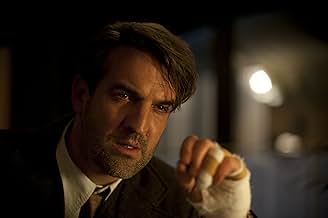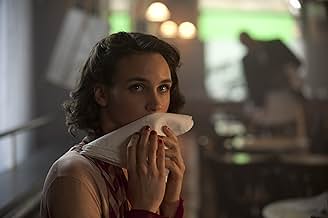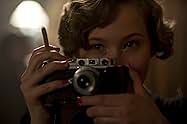Adicionar um enredo no seu idiomaA murder mystery set in Budapest, 1936. Just as Hungary was preparing to allign itself with Hitler, a young beautiful girl is found dead and no one wants to investigate - except Gordon a cri... Ler tudoA murder mystery set in Budapest, 1936. Just as Hungary was preparing to allign itself with Hitler, a young beautiful girl is found dead and no one wants to investigate - except Gordon a crime reporter who has a gut feeling that things are not what they seem.A murder mystery set in Budapest, 1936. Just as Hungary was preparing to allign itself with Hitler, a young beautiful girl is found dead and no one wants to investigate - except Gordon a crime reporter who has a gut feeling that things are not what they seem.
- Direção
- Roteiristas
- Artistas
- Prêmios
- 2 vitórias e 3 indicações no total
- Szöllõsy Fanny
- (as Törõcsik Franciska)
Avaliações em destaque
BUDAPEST NOIR is a murder mystery set in the German influenced Budapest of 1936 with Antisemitism on the rise. Superbly directed, acted, and beautifully lensed by master cinematographer Elemér Ragály. This is by far the Best Hungarian film of the year in what has been a very good year for Magyar cinema generally. In terms of genre the very first film of its kind from this country and an eye opener of the first order.
Zsigmond Gordon (Krisztián Kolovratnik) is a tough scruffy unflappable investigative reporter for the biggest newspaper in Budapest in Horthy's increasingly fascist dominated Hungary. He specializes in murder stories but when a nameless hooker he met the night before is found dead on Nagydiófautca ("Big Walnut Street", the heart of the whorehouse district) and he starts following up on this "fait divers" which nobody else cares about or wants to know about he finds he is on to something far bigger than he bargained for. The mystery moves into high gear when the corpus dilecti disappears from the morgue. The coroner blithely consumes his fresh lunch amidst the freshly dead bodies as Gordon plies him with questions. Meanwhile his ex-girlfriend, Krisztina (who once gave him a very hard time, returns from Germany and plunks herself down in his apartment. Gordon has reservations about resuming the relationship but she's a very good photographer and good pictures are just what he needs to back up his investigation. Dialogue: He: (Cynically) "What happened. Didja give another guy a hard time in Berlin?" She: (Dryly) "Yeah. His name was Adolph and he had a little mustache under his nose".
We soon gather that Krisztina's pictures showing the harassing of Jews got her into political hot water and she had to scram fast. However, she has received offers from Britain ... For the time being, since she is down and out, she is willing to work with Gordon to pay her way. The old flames are rekindled with a flourish of passion in a red dark room as critical pictures are developing and a rousing love scene ensues in the midst of all the noir anxiety and suspense. They are now a couple fighting crime together, but there is always an "if" in the air, because this is after all a film noir... with many surprising Jewish twists and turns (a Jewish ladies prayer book turns out to be a significant clue).
This remarkable movie has the feeling of a Dashiel Hammet or Mickey Spillane thriller time-warped to the mid thirties in central Europe. Kolovratnik is outstanding as the tenacious reporter. So scruffy and noir to the core that he seems to be mouthing pure wisecrack English and could pass for Mike Hammer or Sam Spade if he were a gumshoe instead of a journalist. -- Inspired casting. This hitherto little known actor was born for the role. He won't be little known for long.
All other roles are just as sharply etched, notably "Moochy" Zoltan as a restrained informer minus his customary buzzmeg vocabulary, and Kata Dobó as the flaming red-haired madame of an upscale brothel named "Les Fleurs du Mal". A fancy nightclub called The Ring features female boxers in a real ring as the Floor show. The owner is a wealthy coffee importer with high level connections in Berlin. Here the plot begins to thicken. Set pieces such as the frame-up of the hero are so smoothly handled they more or less ooze from the script. Period decor and reconstruction is letter perfect while those familiar with Budapest will recognize many locations even if slightly modified.
The ending is a pure noir shocker which cannot be revealed here. Shrewd savvy direction by Éva Gárdos, a Hollywood industry veteran who directed the Hungarian American film "An American Rhapsody" with Nastassia Kinski and Scarlett Johansson in 2001, is impeccable. One wonders where she has been hiding all this time. Bottom Line: A perfect Hungarian film noir with kosher overtones but it took a Hungarian expatriate to make it! Splendid job. Ten stars are not enough.
A young woman (Franciska Törocsik) is found dead on a street in the red light district, she has no means of identification apart from a Jewish prayer book. Gordon briefly encountered this woman before and is unwilling to just pass the death off as "just" the murder of a prostitute as the police are keen to do. Joined by his former lover, photographer Krisztina (Reká Tenki) he pursues the case with the determination of a detective rather than just a journalist. Krisztina is all too aware of the rising political tension and Anti-Semitism having just returned from Berlin. As the investigation continues Gordon is warned off by the formerly honest police chief Gellert (Zsolt Anger), he is beaten up by thugs, pistol-whipped by a mobster and Krisztina suffers similar indignities, for this case is bringing them closer to the higher echelons of Hungarian political and business circles.. In a scene reminiscent of Casablanca, Gordon beats up fascists in a bar who object to a "Jewish" song, he is involved in a car chase pursued by communists, yes, this is no ordinary murder. But he goes where the evidence takes him.
The Budapest of 1936 is vividly recreated by director Eva Gardos along with cinematographer Elemer Ragalyi and set designer Pater Sparrow. Tight outdoor shots in present day Budapest avoid the necessity of CGI. Beautiful interiors have been crafted with an elite nightclub providing boxing matches between women over dinner and politicians playing cards upstairs, in a high class brothel women may be chosen from a pictorial menu. This contrasts with street corner card games and bare-knuckle boxing in the streets. Adapted from the eponymous novel by Vilmos Kondor, with the screenplay written by Andras Szeker. 8/10
As always, movies introduce changes from their original books to make the movie more "movie-like", and while I understand that it is difficult to have source material that is hundreds of pages long, something has got to go, I felt that they made some significant changes that lead to a worse movie.
In the books Zsigmond Gordon is quite a nice guy. He treats his girlfriend/wife all in all pretty well. In the movie he is portrayed as a bit of a chauvinist, a womanizer. The madame at the wh**e-house was also portrayed in a very different way, in the book she was sad and lonely. And so on, there are several changes like this.
Several of the locations felt very much like shot in a studio lot, which was also a shame since it would've given much more authenticity to the movie if more was shot in Budapest. But a difficult thing to pull of, logistically. The direction and acting was stiff at times, but all in all, not bad for a Hungarian movie with a limited budget.
In any case, a watchable movie!
Couple of comments: this is the big screen adaptation of the Hungarian bestseller, reportedly the first book noir in Hungary's history. I haven't read the book so I can't comment on how close the film stays to the book (or not). What I can comment on is that, regretfully, the movie lacks on all levels. The performers act in a wooden and very staged way, and you can practically hear the director yell "and... ACTION" at the beginning of each scene. I can't recall the last time i saw a film so incredibly awkward. As to the film's "noir" element, there's a lot (and I mean, a LOT) of cigarette smoking going on... That's about the only aspect I detected as being "noir". Bottom line: at no time did I feel ever any emotional connection or involvement with the movie's characters. I should care who murdered the young woman and wonder why she was murdered, but I simply didn't...
I recently saw this film at the 2019 Jewish & Israeli Film Festival here in Cincinnati, celebrating its 30th anniversary this year. I have attended the festival for years, and most of the time the festival's planning committee does an excellent job in putting together a worthwhile and engaging program. Alas, on this one, they simply whiffed and I cannot recommend "Budapest Noir" to anyone in good conscience, sorry.
Você sabia?
- Erros de gravaçãoThere is a (beautiful ) Coffee machine, ELEKTRA Micro Casa Semiautomatica which is an espresso machine using pressure (pump) to brew coffee. The movie is set in 1936, but it's only in 1938 that Achille Gaggia started to brew espresso coffee by means of pressure through a piston system (later by mean of a pump)
- Citações
Gordon Zsigmond: Budapest. For some, it's the city of death, for others, it's the city of lights.
Principais escolhas
- How long is Budapest Noir?Fornecido pela Alexa
Detalhes
- Data de lançamento
- País de origem
- Centrais de atendimento oficiais
- Idiomas
- Também conhecido como
- Budapest Noir
- Locações de filme
- Empresa de produção
- Consulte mais créditos da empresa na IMDbPro
Bilheteria
- Orçamento
- HUF 897.382.877 (estimativa)
- Faturamento bruto mundial
- US$ 283.704
- Tempo de duração1 hora 35 minutos
- Cor
- Proporção
- 1.85 : 1

